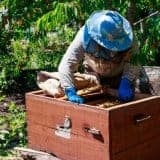How To Start a Beekeeping Business
There’s never been a better time to start a beekeeping business — honeybees are not only fantastic little workers, helping to maintain our environment and making honey in the process, they’re essential to our ecosystem and to our presence on this planet.
If you want to start a beekeeping business, you’re probably already familiar with certain aspects of beekeeping. While your goal is to collect honey, you’ll also get to know your bee colony — how they act, when they’re happy, and when they’re distressed. Because this business lives and dies on, well, keeping your workers alive, anyone looking to start a beekeeping business should be enthusiastic about a career that depends on nature, as capricious as she may be. Keep reading for our round up of advice for anyone looking to start a beekeeping business!
Start a Beekeeping Business: First Steps
Because beekeeping is a business that produces a high concentration of bees in outdoor spaces, it’s important that you check with your municipality to find out about any zoning and permit roadblocks you might face. If there’s a homeowners association where you plan to start a beekeeping business, you’ll also need their permission. Certain states and countries also have very specific regulations for beekeeping businesses — you’ll probably want to get in touch with a lawyer who specializes in agricultural businesses to get the low-down on your area.
Once you know you have or will be able to obtain the appropriate permissions and permits, it’s time to choose a name and a business structure. Check out our in-depth articles on business structures in the United States, the UK, and France if you’re unsure of what sort of business structure will work for you. It can be entirely circumstantial — will you be renting or buying property, or operating the business out of your home? Will you be employing people, working alone, or in a partnership? And finally, are you taking out a loan, is your family floating you the startup capital, or are you and a few friends pooling your resources? All of these questions will come into play when you’re starting a beekeeping business.
Insurance is going to be a significant concern that you will regret neglecting — in fact, you can find specialized Apiculture Insurance plans specifically for when you start a beekeeping business. This is because beekeeping, for all its rewards, does come with significant risks, both in terms of health and safety, as well as in terms of potential loss (for example, if your hive is stolen or all catch a virus and die). Imagine: a kid gets stung by one of your bees and is allergic, someone claims your honeycomb had worms in it, or your bees start swarming your neighbor’s garden. Homeowner’s insurance might not cover you for the total expenses of medical bills or possible lawsuits you risk incurring here, so you’ll definitely want to look into specialized Liability Insurance that can cover you for a very hefty sum. But don’t worry, it’ll usually run you less than $1000 a year for this kind of package, and you’ll sleep easier. Only once you’ve taken care of all of these steps will you be ready to obtain your honeybee colony, which you can obtain by buying a starter pack (of bees, including a Queen and her henchmen) from another local beekeeper, or online.
Caring for Your Colony
Honeybees are industrious little workers and sturdier than we give them credit for, but it’s important that you, as their beekeeper, take their well-being seriously. When you start a beekeeping business, you’ll need to do lots of research on how exactly to best care for honeybees in your region. You need to be aware of their local predators, as well as viruses and bacteria that might make them sick and is present in your area. You’ll need to pay attention to the weather, temperature, and your bees’ food supply, and make sure that they have food (pollen and honey) and water during the winter seasons so that they can stay alive during off-season and get back to work when the time is right.
How Do Beekeepers Make Money?
Beekeepers, whether independent or commercial, make their money off of the products that their bees produce. And don’t be fooled, bees make way more than honey (although that is, obviously, a big one). Bees also make honeycomb. Honeycomb is a product that can be made into beeswax and used in cosmetic products and candles, for example. Along with beeswax and honey, you may also decide to harvest Royal jelly. Worker bees feed Royal jelly to the Queen Bee, but it can also be harvested from 2- to 3-day-old larvae. Royal jelly’s commercial success has greatly increased over years, and today it is a popular holistic health product — and, you may have noticed, it’s not cheap.
Selling honey, candles, honeycomb, and beeswax- and royal-jelly based cosmetics are all fantastic ways to make a living after you start a beekeeping business. Get in touch with health food stores, local naturopaths, and local artisanal boutiques and gift shops who may be interested in selling your products. If you’re harvesting enough honey and honeycomb, you may also be interested in getting in touch with local restaurants, who may wish to buy your products in bulk. Keep up-to-date on local and even distant craft fairs and farmer’s markets, where your products will have a new audience and even more of a chance to generate word-of-mouth.
Ultimately, the more honeybees you have, the more product you’ll make. Having a good stretch of land upon which to work and a large honeybee colony will be important not only when you start a beekeeping business, but especially if you want that business to expand. A strong business plan is an essential element in starting any business, but especially in planning for its continued success. Make sure that you check out our free business plan templates available for download to help you get the ball rolling.
If you’d like to start a beekeeping business, you can rest assured that it’s a highly rewarding and fascinating profession. But you’ll need to be vigilant on a number of different fronts, from caring for your honeybees, to being smart about harvesting your products and buying the right insurance plans. However, in spite of its challenges, if you start a beekeeping business, you’ll know that you’ve made a decision that will not only benefit you, but our planet as a whole.


























